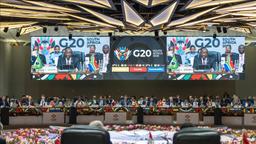
TEPAV attended the T20 Inception Conference held in New Delhi, India on 13-14 January 2023 organized with the participation of the members of research institutes and Think Tanks and chairs and co-chairs of Task Forces under T20.
TEPAV attended the T20 Inception Conference held in New Delhi, India on January 13-14, 2023 with the T20 working group consisting of TEPAV Founding Director Güven Sak, G20 Studies Center Director Sait Akman and Economic Data Analysis Center Director Gülbin Şahinbeyoğlu.
Members of the Think Tanks, research institutes and chairs and co-chairs of the Task Forces under the T20 joined the conference where the opening speech was delivered by Amitabh Kant, G20 India Sherpa and keynote addresses were given by Oil, Natural Gas Minister Hardeep S. Puri and Ministry of Foreign Affairs G20 Secretary Eenam Gambhir. The plenary sessions and panels were held in four different themes based on the priority research areas determined for G20 India, and breakout sessions were organized for each task force. TEPAV Economic Data Analysis Center Director Gülbin Şahinbeyoğlu took part as a speaker in the session titled “Global Financial System and Macroeconomic Stability”, the working group also participated in breakout sessions.
Multilateral institutions need reform
In the first plenary session titled “Reformed Multilateralism: A Global Imperative”, the importance of the international rules-based system in ensuring global stability was emphasized by pointing out that polarization is getting stronger and the existence of multilateralism has become questionable in the rapidly changing economic and political global conjuncture. In this context, it was stated that there is an urgent need for reform in key multilateral institutions such as the World Health Organization (WHO), the World Trade Organization (WTO), the United Nations (UN), the International Monetary Fund (IMF), and thus, the G20 has an important role in the construction and coordination of this process.
Communication between G20 countries should be strengthened
In the second plenary session titled “Global Financial System and Macroeconomic Stability”, it was stated that the economic recovery process observed after COVID-19 stalled with the invasion of Ukraine by Russia and the increase in commodity prices, especially energy and food prices, heightened inflationary pressures while the monetary and fiscal incentives provided during and after the COVID-19 led to record-high public debt levels in many G20 countries. Given these current economic conditions, ensuring the sustainability of public finances under high inflation and tightening financing conditions, the coordination of monetary and fiscal policies while global supply shocks continue, and the determination of best policy mix to mitigate and adapt to climate change were identified as key challenges for policy makers. In this framework, the G20’s existing monitoring schemes in identifying macroeconomic vulnerabilities can be strengthened, supply chain resilience against future economic shocks can be increased, and G20 can guide the structural policies including green-digital transformation. It was also emphasized that coordination and communication among G20 countries should be strengthened, and data and information sharing should increase.
G20 plays an important role in solving global economic problems
Speaking at the session titled "Global Financial System and Macroeconomic Stability", TEPAV’s Director Gülbin Şahinbeyoğlu mentioned that one of the lowest growth levels in the last 30 years has been expected in 2023, which reflects the historically high levels of inflation, tight credit conditions, increasing borrowing costs and shrinking financial areas. Highlighting the global effects of macro policies pursued by the advanced countries, Şahinbeyoğlu emphasized the importance of coordination of monetary and fiscal policies, the necessity of transparent and predictable policy steps, and thus, the need for strengthening of policy communication. Şahinbeyoğlu, by pointing out the global structure of the economic and financial risks, said, “Solutions also need to be produced on a global scale and in a coordinated manner. The G20 plays an important role in the search for a common ground. Monitoring global risks is also important in determining the right policies. By developing monitoring systems such as the Data Gap Initiative, which the G20 has successfully established, data and information sharing can be extended, and studies such as risk spillover analyses can be shared.”
Consumption patterns should be changed
In the third plenary session titled “Finding Consensus on Global Wellbeing: LiFE, Energy Transitions and the SDGs”, values and standards were brought to the agenda in line with the common goal of changing consumption patterns and ensuring security in food, water and biodiversity to ensure sustainable development. It was pointed out that the G20 can create global awareness in safeguarding equitable and inclusive growth, supporting green transition and adaptation to climate change, and can provide holistic support by developing joint proposals for economic, social and environmental development.
Digitalization is the key to sustainable development
In the last session titled “Beyond the Banter: Inclusive Digital Infrastructure and Agenda 2030”, it was stated that digitalization is the key to achieving the Sustainable Development Goals and in this context, India's Digital Public Infrastructure (DPI) experience is inclusive, reliable and a good country practice for G20 countries in serving the global benefit. It was emphasized that the G20 will not only be a pioneer in the development of digital public goods, but also build common ground on key issues such as security and governance that will be influential in the digital future. The importance of regulatory measures was also highlighted in the session.
“One World, One Family, One Future”
India took over the G20 presidency as of December 1, 2022 and announced the theme of the year as “One World, One Family, One Future”. Its priority areas were set as inclusive, equitable and sustainable growth; LiFE (lifestyle for environment); women’s empowerment; digital public infrastructure and tech-enabled sectoral development; climate financing; circular economy; global food security; energy security; green hydrogen; disaster risk reduction and resilience; fight against economic crimes; and multilateral reforms.
Within the framework of these priorities, the Think 20 (T20) group, which includes TEPAV, established seven Task Forces (TF) in order to coordinate the background researches effectively. Task Forces and their fields of study were determined as follows:
TF 1 - Macroeconomics, Trade, and Livelihoods: Policy Coherence and International Coordination
TF 2 - Our Common Digital Future: Affordable, Accessible and Inclusive Digital Public Infrastructure
TF 3 - LiFE, Resilience, and Values for Wellbeing
TF 4 - Refuelling Growth: Clean Energy and Green Transitions
TF 5 - Purpose & Performance: Reassessing the Global Financial Order
TF 6 - Accelerating SDGs: Exploring New Pathways to the 2030 Agenda
TF 7 - Towards Reformed Multilateralism: Transforming Global Institutions and Frameworks
T20 India and Task Forces will continue their activities throughout the year and will share their research at the Global Think Tank Townhall 2023 on March 5, 2023, the T20 Mid-Year Conference on May 10-11, 2023, and the T20 Summit on August 1-2, 2023.
Information on side events, published policy notes and other research can be reached at T20 India's website.




